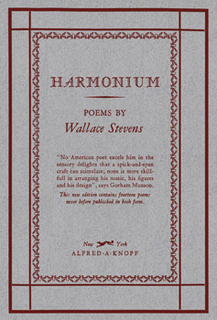Related Research Articles

Harmonium is a book of poetry by American poet Wallace Stevens. His first book at the age of forty-four, it was published in 1923 by Knopf in an edition of 1500 copies. This collection comprises 85 poems, ranging in length from just a few lines to several hundred. Harmonium was reissued in 1931 with three poems omitted and fourteen new poems added.
"Peter Quince at the Clavier" is a poem from Wallace Stevens's first book of poetry, Harmonium. The poem was first published in 1915 in the "little magazine" Others: A Magazine of the New Verse, edited by Alfred Kreymborg.
"Ploughing on Sunday" is a poem from Wallace Stevens's first book of poetry, Harmonium (1923). First published in 1919, it is now in the public domain.
"O Florida, Venereal Soil" is a poem from Wallace Stevens's first book of poetry, Harmonium. It was first published in the journal Dial, volume 73, July 1922, and is therefore in the public domain.
"The Apostrophe to Vincentine" is a poem from Wallace Stevens's first book of poetry, Harmonium (1923). It was first published before 1923 and is therefore in the public domain according to Librivox.
"Of the Surface of Things" is a poem from Wallace Stevens's first book of poetry, Harmonium (1923). It was first published in 1919, so it is in the public domain.
"Anecdote of the Prince of Peacocks" is a poem from Wallace Stevens's first book of poetry, Harmonium (1923). It was one of the few Harmonium poems first published in that volume, so it is still under copyright. However, it is quoted here as justified by Fair use to facilitate scholarly commentary.
"Sunday Morning" is a poem from Wallace Stevens' first book of poetry, Harmonium. Published in part in the November 1915 issue of Poetry, then in full in 1923 in Harmonium, it is now in the public domain. The first published version can be read at the Poetry web site: The literary critic Yvor Winters considered "Sunday Morning" "the greatest American poem of the twentieth century and... certainly one of the greatest contemplative poems in English".
"The Curtains in the House of the Metaphysician" is a poem from Wallace Stevens's first book of poetry, Harmonium. It was originally published in 1919, so it is in the public domain.
"The Cuban Doctor" is a poem from Wallace Stevens's first book of poetry, Harmonium. It was first published in the journal Poetry in October 1921, so it is in the public domain.
"Stars at Tallapoosa" is a poem from Wallace Stevens's first book of poetry, Harmonium. It was first published in 1922, so it is in the public domain.
"Explanation" is a poem from Wallace Stevens's first book of poetry, Harmonium (1923). It was first published in 1917, so it is in the public domain.
"Six Significant Landscapes" is a poem from Wallace Stevens's first book of poetry, Harmonium. It was first published in 1916, so it is in the public domain.
"Anecdote of the Jar" is a poem from Wallace Stevens's first book of poetry, Harmonium. First published in 1919, it is in the public domain.
"Palace of the Babies" is a poem from Wallace Stevens's first book of poetry, Harmonium. It was first published in 1916 and is therefore in the public domain.
"Life is Motion" is a poem from Wallace Stevens's first book of poetry, Harmonium. It was first published in 1919, so it is in the public domain.
"Thirteen Ways of Looking at a Blackbird" is a poem from Wallace Stevens's first book of poetry, Harmonium. The poem consists of thirteen short, separate sections, each of which mentions blackbirds in some way. Although inspired by haiku, none of the sections meets the traditional definition of haiku. It was first published in October 1917 by Alfred Kreymborg in Others: An Anthology of the New Verse and two months later in the December issue of Others: A Magazine of the New Verse.
"To the One of Fictive Music" is a poem from Wallace Stevens's first book of poetry, Harmonium. First published in 1922, it is in the public domain.
"Hymn From A Watermelon Pavilion" is a poem from Wallace Stevens's first book of poetry, Harmonium. It was first published in 1917, so it is in the public domain.
"The Man Whose Pharynx Was Bad" is a poem from Wallace Stevens's first book of poetry, Harmonium. First published in 1921, it is in the public domain in the United States.
References
- Buttel, R. Wallace Stevens: The Making of Harmonium. 1967: Princeton University Press.